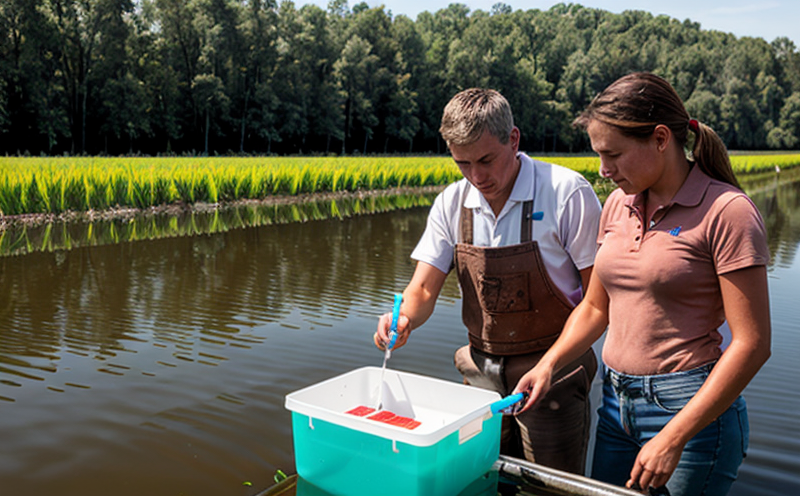Ammonium-Nitrogen Testing in Agricultural Water
The testing of ammonium-nitrogen (NH4+ and NO3-) in agricultural water is essential to ensure the health of crops, livestock, and the environment. Ammonium nitrogen can be a significant component of fertilizers but also poses risks if present at high levels in irrigation systems or surface waters. This section will delve into the importance of ammonium-nitrogen testing, the methods used, and why it is crucial for agriculture.
Ammonium nitrogen is prone to volatilization when exposed to air, making it more mobile than nitrate nitrogen. It can lead to ammonia poisoning in livestock if consumed directly from contaminated water sources or soil. Excessive ammonium levels can also harm beneficial microorganisms and contribute to eutrophication of nearby waters. In plants, too much ammonium can disrupt the balance with nitrate, leading to nutrient deficiencies.
Testing for ammonium nitrogen is particularly important in irrigation systems where improper management of fertilizers can lead to overapplication or leaching into groundwater. The ISO 6871:2014 method provides a standardized approach for the determination of ammonium nitrogen in water, ensuring consistency across different laboratories.
The testing process involves several steps. Initially, water samples are collected from irrigation systems or other relevant sources using clean containers to prevent contamination. These samples need to be kept cold and analyzed as soon as possible after collection due to potential chemical changes over time. Before analysis, pH adjustment may be necessary depending on the method being used.
The most common analytical techniques for ammonium-nitrogen testing include:
- Flow injection analysis (FIA), which offers fast results and high precision,
- Bisulfite methods that react with ammonia to form nitrogen oxides, followed by measurement of these compounds,
- Potentiometric titration using a pH meter,
- UV-visible spectrophotometry for quantitative determination.
The choice of method depends on factors such as the required precision, availability of equipment, and cost considerations. The ISO 6871:2014 specifies these methods in detail.
Accuracy is paramount when conducting ammonium-nitrogen testing to ensure correct application rates of fertilizers and safe irrigation practices. Inaccuracies can lead to over-fertilization, which increases production costs while also posing risks to soil health and water quality. Proper calibration of equipment and adherence to standard operating procedures are crucial in achieving reliable results.
For effective ammonium-nitrogen management, regular testing should be conducted throughout the growing season. This helps farmers monitor their irrigation practices and adjust fertilizer application as needed. By doing so, they can prevent any negative impacts on soil health or water quality while optimizing crop yield.
Applied Standards
Several international standards exist for ammonium-nitrogen testing in agricultural waters. The ISO 6871:2014 provides a general guideline, while more specific methods include:
- ASTM D1253-19 Standard Test Method for Determination of Nitrogen Compounds in Water by Flow Injection Analysis
- ISO 6871:2014 Environmental Quality—Water from Irrigation Systems—Determination of Ammonium Nitrogen and Nitrate Nitrogen
These standards provide the necessary protocols for accurate measurement, ensuring consistency across different laboratories. Compliance with these guidelines is crucial to maintain both environmental protection standards as well as agricultural productivity.
The ISO 6871:2014 standard particularly emphasizes the importance of proper sample collection and handling, which can significantly impact test results. It recommends using appropriate containers made from inert materials to avoid introducing errors into the analysis.
Additionally, ASTM D1253-19 focuses on flow injection analysis (FIA), which is known for its speed and precision. This method allows laboratories to process multiple samples simultaneously, increasing efficiency without compromising accuracy.
In summary, adherence to these standards ensures that ammonium-nitrogen levels are accurately measured, thereby supporting sustainable agricultural practices and environmental protection efforts.
Eurolab Advantages
At Eurolab, we pride ourselves on delivering high-quality analytical services tailored specifically for the agriculture & forestry sector. Our expertise in water quality testing ensures that our clients receive reliable results every time. Here are some of the key advantages that set us apart:
- Comprehensive Knowledgebase: Eurolab's team comprises highly qualified professionals with extensive experience in agricultural water analysis.
- State-of-the-Art Facilities: Equipped with cutting-edge instrumentation and equipment, our laboratories can handle a wide range of sample types and concentrations.
- Accurate Methodology: We strictly follow internationally recognized standards like ISO 6871:2014 to ensure consistent and accurate results.
- Fast Turnaround Times: Our streamlined processes allow us to deliver reports within days, enabling quick decision-making by our clients.
- Customer-Specific Solutions: Every project is unique. Eurolab offers customized testing packages designed specifically for each client's needs.
- Comprehensive Reporting: All findings are documented meticulously and presented clearly in detailed reports accompanied by graphs when necessary.
- Continuous Quality Assurance: Regular internal audits ensure that all procedures meet the highest standards of quality.
With Eurolab, you can trust that your agricultural water testing needs will be met with precision, reliability, and efficiency. Our commitment to excellence has earned us a reputation as leaders in this field.
Customer Impact and Satisfaction
The importance of accurate ammonium-nitrogen testing cannot be overstated for the agriculture & forestry sector. Proper management of these compounds directly affects crop health, livestock welfare, and environmental sustainability. By utilizing our services, customers experience several benefits:
- Improved Crop Yield: Correctly managed ammonium levels ensure that plants receive optimal nutrition without suffering from nutrient imbalances.
- Better Water Quality: Monitoring ammonium-nitrogen prevents contamination of irrigation systems and surrounding water bodies, promoting cleaner environments for all stakeholders involved.
- Economic Efficiency: Avoiding over-fertilization reduces costs associated with unnecessary chemical purchases while maintaining high yields.
- Sustainable Practices: Adherence to best practices recommended by our testing results supports long-term sustainability goals for farms and forests alike.
To date, many of our clients have reported increased productivity and reduced operational expenses following implementation of our recommendations based on Eurolab's analyses. Their feedback underscores the value we bring not only in terms of technical expertise but also in fostering sustainable practices within their operations.





